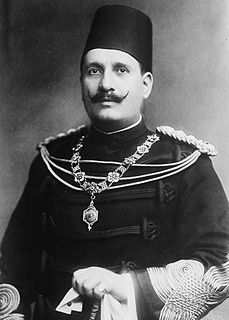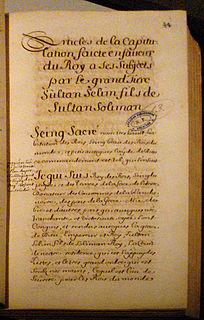Related Research Articles
Extraterritoriality is the state of being exempted from the jurisdiction of local law, usually as the result of diplomatic negotiations.

King of Egypt was the title used by the ruler of Egypt between 1922 and 1951. When the United Kingdom ended its protectorate over Egypt on 28 February 1922, Egypt's Sultan Fouad I issued a decree on 15 March 1922 whereby he adopted the title of King of Egypt. It has been reported that the title change was due not only to Egypt's newly independent status, but also to Fouad I's desire to be accorded the same title as the newly installed rulers of the newly created kingdoms of Hejaz, Syria and Iraq. The only other monarch to be styled King of Egypt was Fouad I's son Farouk I, whose title was changed to King of Egypt and the Sudan in October 1951 following the Wafdist government's unilateral abrogation of the Anglo-Egyptian Treaty of 1936. The monarchy was abolished on 18 June 1953 following the Egyptian Revolution of 1952 and the establishment of a republic. The then-king, the infant Fuad II of Egypt, went into exile in Switzerland.

Hussein, Pasha Roshdy (1863–1928) was an Egyptian political figure of Turkish origin who served as Prime Minister of Egypt between 1914 and 1919. Under pressure from British authorities, Roshdy issued a “Decision of the Council of Ministers” which essentially declared war against the Central Powers in the First World War. He was later forced to resign for failing to resolve a strike by government officials demanding mandatory recognition of the Egyptian delegation by the cabinet and the withdrawal of British sentries and guards.

Capitulations of the Ottoman Empire were contracts between the Ottoman Empire and European powers, particularly France. Turkish capitulations, or Ahidnâmes were generally bilateral acts whereby definite arrangements were entered into by each contracting party towards the other, not mere concessions.
Mahmoud Shokry, was a chief of staff of the Egyptian Army with the rank of Fariq. He was appointed by King Farouk after the signing of the Anglo-Egyptian Treaty of 1936 which led to the withdrawal of British forces from Egypt. He has a street in the heart of Cairo named after him.

Aziz Ezzat Pasha was an Egyptian politician.
Regencies in Egypt date back to Pharaonic times. Throughout Egypt's long history, there have been several instances of regents assuming power due to the reigning monarch's minority, physical illness or poor mental health. There have also been several cases of coregencies where two monarchs ruled simultaneously.
King of Egypt and the Sudan was the title used by the Egyptian monarch from 16 October 1951 until the abolition of the monarchy on 18 June 1953.

Prince of the Sa'id was the title used by the heir apparent to the Egyptian throne prior to the abolition of the monarchy following the Egyptian Revolution of 1952. The title translates as Prince of Upper Egypt.

The Ministry of Foreign Affairs of the Arab Republic of Egypt is the Egyptian government ministry which oversees the foreign relations of Egypt. On 17 July 2014 Sameh Shoukry was appointed Minister of Foreign Affairs.

Younan Labib Rizk was a prominent Egyptian historian and literary figure. He was a professor of history at Ain Shams University in Cairo; and was also appointed a member of the History Committee of the Supreme Council for Culture. He was formerly Director of Historical Studies at the Institute of Research and Arab Studies. Rizk was a prolific writer with a weekly column appearing in Al-Ahram newspaper where he founded and headed the History Studies Centre. He was the author of several esteemed publications which rendered him an authority on Modern History, which was the subject of his MA and PhD degrees in 1963 and 1967 respectively. Rizk received numerous awards and medals, including State Incentive Award in Social Sciences in 1995. On the national level, he played a significant role in the dispute over Taba with Israel in 1986–88. The issue was subject to international arbitration and was ruled in Egypt's favor.
An agreement concluded between the British and Greek governments in Athens on 22 August /4 September 1920, in order to regulate legal relations between Greek citizens and the court system in Egypt. Ratifications were exchanged in Athens on 4 January 1921 and the agreement went into effect. It was registered in the League of Nations Treaty Series on 26 February 1921.
An agreement concluded between the British and Norwegian governments in Christiania on April 22, 1921, in order to regulate legal relations between Norwegian citizens and the court system in Egypt. Ratifications were not exchanged for this agreement, since the issue was not mentioned in it, and the agreement went into effect. It was registered in the League of Nations Treaty Series on May 28, 1921.
An agreement concluded between the British and Swedish governments in Stockholm on 8 July 1921, in order to regulate legal relations between Swedish citizens and the court system in Egypt. Ratifications were not exchanged for this agreement, since that was not required by its provisions, and the agreement went into effect. It was registered in the League of Nations Treaty Series on 19 July 1921.
An agreement concluded between the British and Danish governments in Copenhagen on 14 July 1921, in order to regulate legal relations between Danish citizens and the court system in Egypt. Ratifications were not exchanged for this agreement, since that was not required by its provisions, and the agreement went into effect. It was registered in the League of Nations Treaty Series on 20 August 1921.
The Agreement between Great Britain and Portugal Relating to the Suppression of the Capitulations in Egypt (1920) was an agreement concluded between the British and Portuguese governments in Lisbon on 9 December 1920, in order to regulate legal relations between Portuguese citizens and the court system in Egypt. Ratifications were exchanged in Lisbon on 29 September 1921 and the agreement went into effect. It was registered in the League of Nations Treaty Series on 12 December 1921.
The Mixed Courts of Egypt were founded in October 1875 by the Khedive Isma'il Pasha. Designed by Nubar Nubarian Pasha to be part of the Khedive's great plans for Egypt, the Mixed Courts led to a radical reform of Egypt's chaotic nineteenth century legal system, where Consular courts competed with Government tribunals and religious courts for jurisdiction. The completion of the Suez Canal (1869) and the development of the cotton trade had attracted many foreign interests and foreign nationals to Egypt.
Saleem Takla was the founder of Al-Ahram with his brother Beshara Takla.
Under the Muhammad Ali dynasty, the line of succession to the former Egyptian throne was subject to a number of changes during its history. From its founding in 1805 until 1866, the dynasty followed the imperial Ottoman practice of agnatic seniority, whereby the eldest male in any generation would succeed to the throne. In 1866, however, the then Khedive of Egypt Isma'il Pasha obtained a firman from the Ottoman Emperor which restricted the succession to the male-line descendants of Isma'il Pasha. The resulting succession remained in force until the abolition of the Egyptian monarchy in 1953, following the 1952 Egyptian Revolution.
Naima Ilyas al-Ayyubi was the first female lawyer in Egypt. In 1933 she became the first woman to complete a bachelor's degree in the Faculty of Law at an Egyptian university.
References
- ↑ League of Nations Treaty Series, vol. 182, pp. 38–103.